Life Course Approaches to Health, Well-being, and Ageing Essay
VerifiedAdded on 2022/12/29
|13
|4723
|70
Essay
AI Summary
This essay provides an in-depth analysis of the life course approach to health, well-being, and ageing. It explores the biological aspects of ageing, including molecular and cellular damage, and discusses the increasing global lifespan. The essay examines the challenges faced by older people, such as ageism, social isolation, and health issues like hearing problems, heart diseases, and cancer. It highlights the impact of psychosocial factors, including stress, depression, and social determinants, on the health and well-being of older adults. The essay also discusses geriatric syndromes and the challenges of elder abuse, emphasizing the importance of supportive environments and healthy behaviors. The conclusion underscores the need for care and support to ensure a healthy and fulfilling life for the ageing population. The essay also mentions the challenges related to the dependency of older people on the working population.
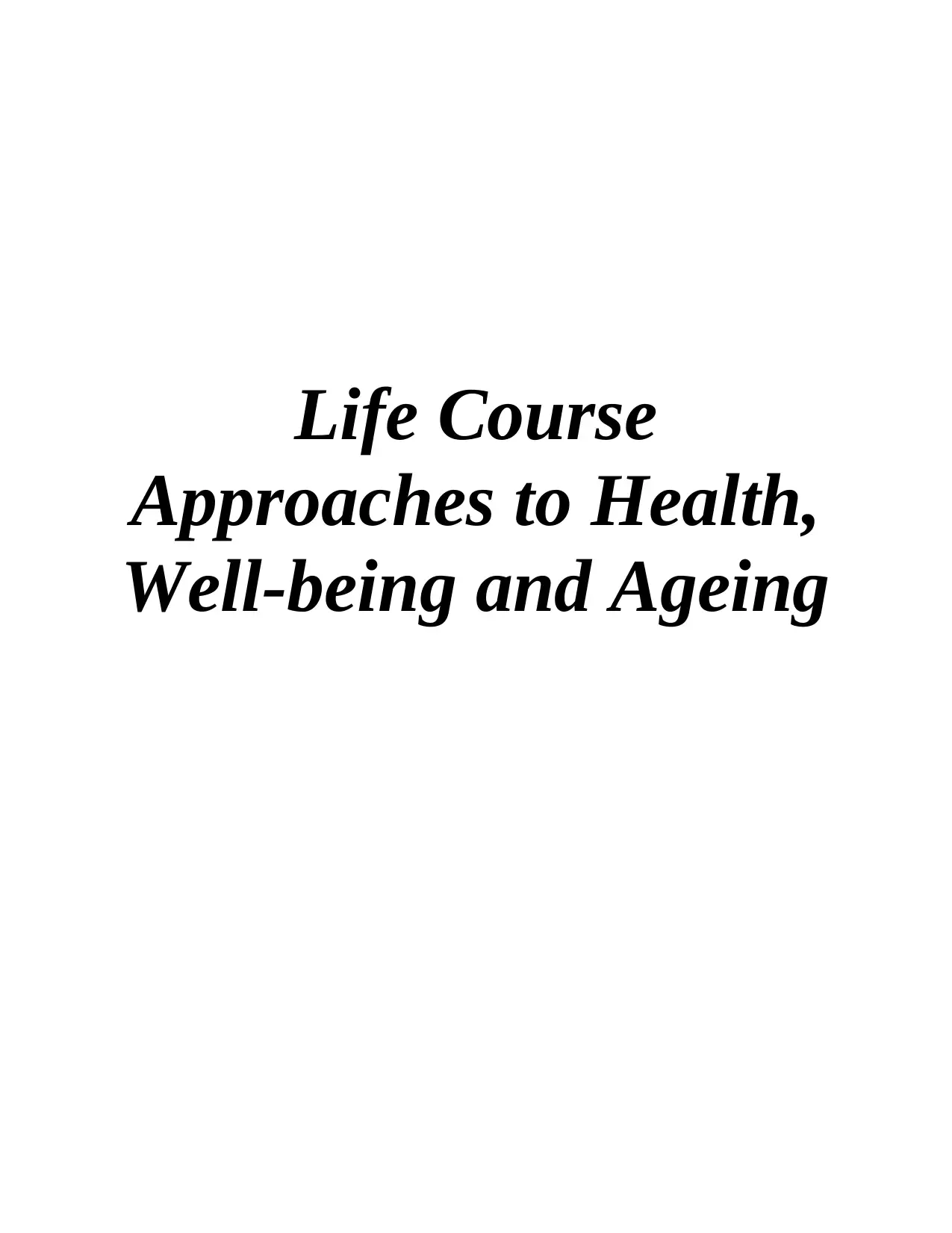
Life Course
Approaches to Health,
Well-being and Ageing
Approaches to Health,
Well-being and Ageing
Paraphrase This Document
Need a fresh take? Get an instant paraphrase of this document with our AI Paraphraser
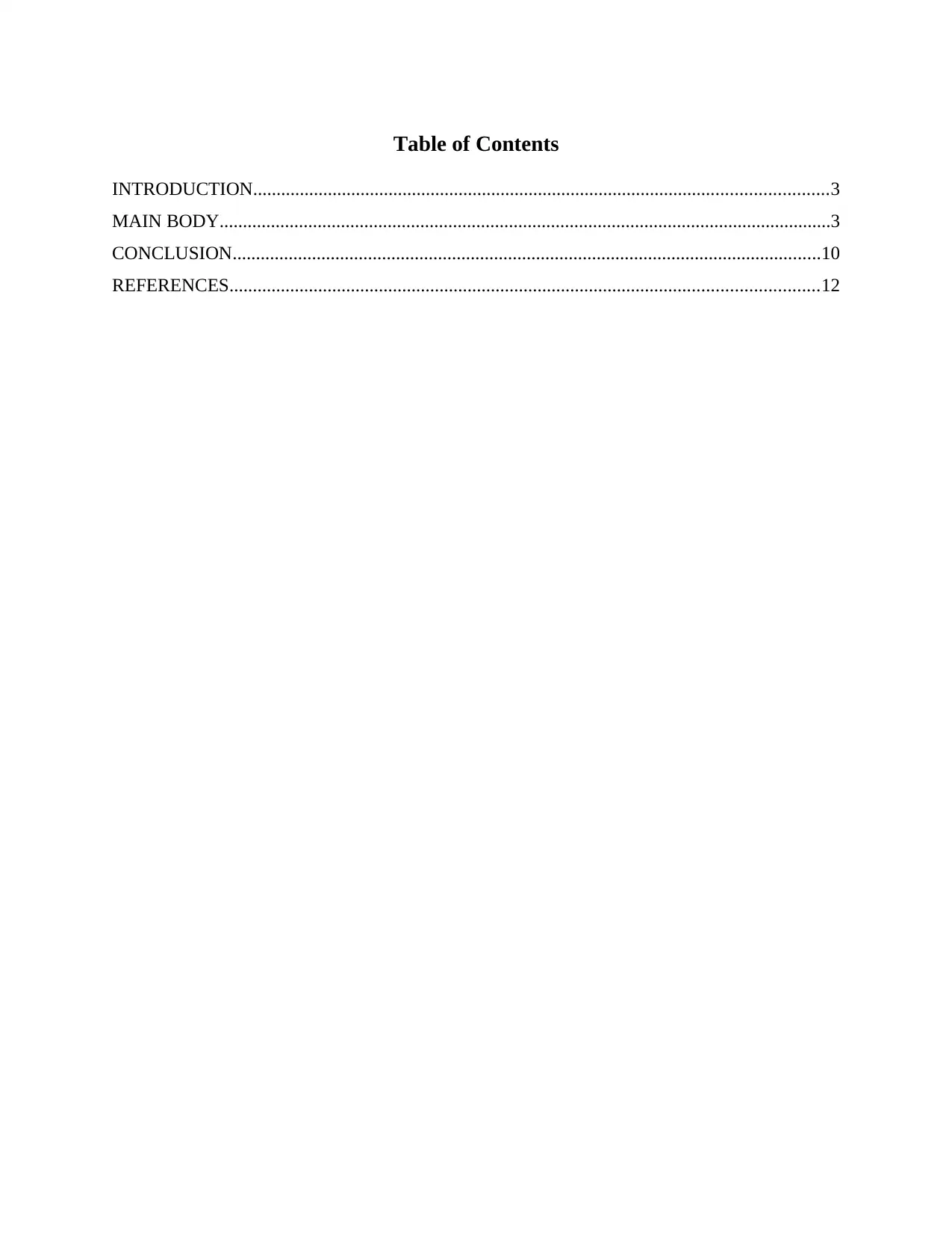
Table of Contents
INTRODUCTION...........................................................................................................................3
MAIN BODY...................................................................................................................................3
CONCLUSION..............................................................................................................................10
REFERENCES..............................................................................................................................12
INTRODUCTION...........................................................................................................................3
MAIN BODY...................................................................................................................................3
CONCLUSION..............................................................................................................................10
REFERENCES..............................................................................................................................12
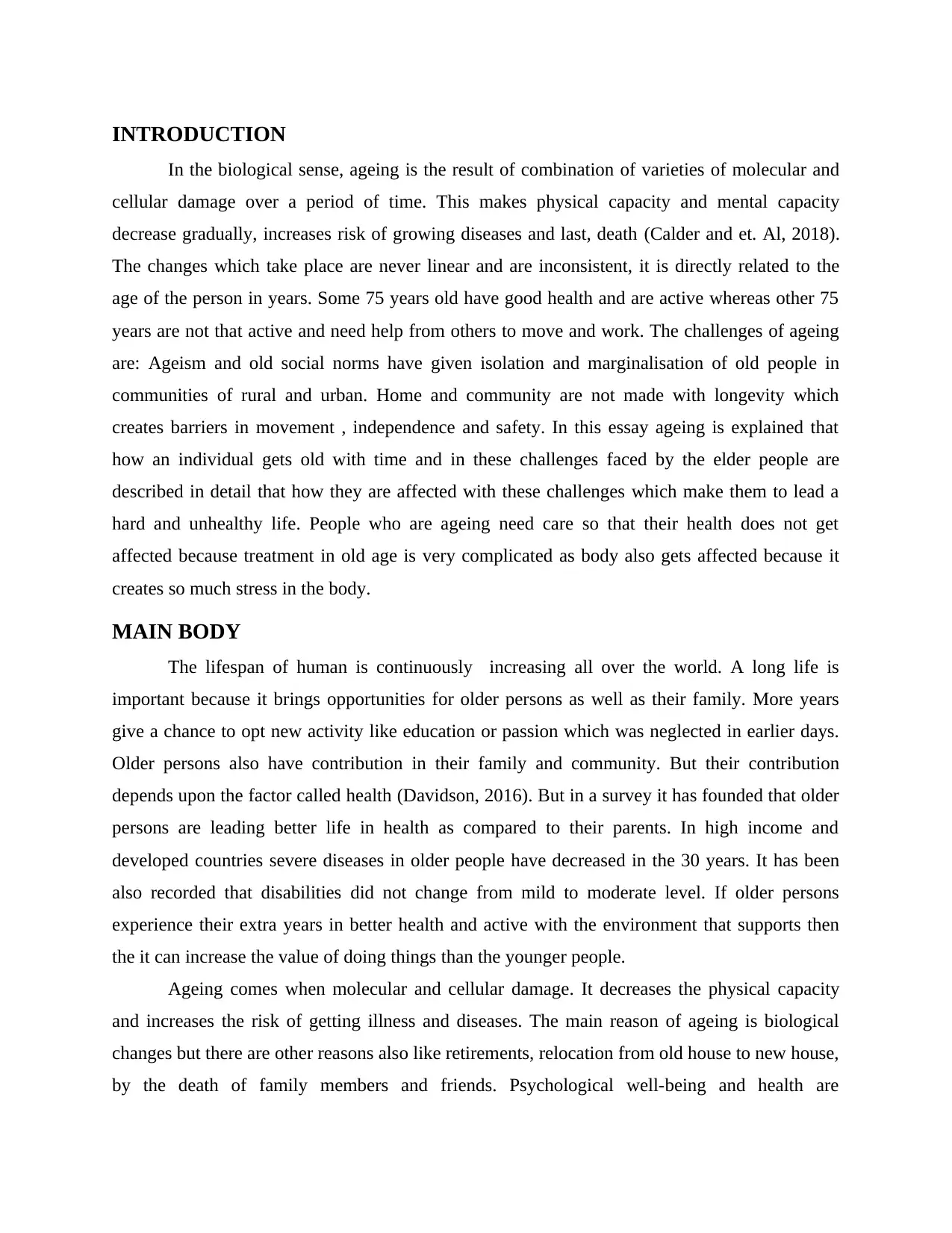
INTRODUCTION
In the biological sense, ageing is the result of combination of varieties of molecular and
cellular damage over a period of time. This makes physical capacity and mental capacity
decrease gradually, increases risk of growing diseases and last, death (Calder and et. Al, 2018).
The changes which take place are never linear and are inconsistent, it is directly related to the
age of the person in years. Some 75 years old have good health and are active whereas other 75
years are not that active and need help from others to move and work. The challenges of ageing
are: Ageism and old social norms have given isolation and marginalisation of old people in
communities of rural and urban. Home and community are not made with longevity which
creates barriers in movement , independence and safety. In this essay ageing is explained that
how an individual gets old with time and in these challenges faced by the elder people are
described in detail that how they are affected with these challenges which make them to lead a
hard and unhealthy life. People who are ageing need care so that their health does not get
affected because treatment in old age is very complicated as body also gets affected because it
creates so much stress in the body.
MAIN BODY
The lifespan of human is continuously increasing all over the world. A long life is
important because it brings opportunities for older persons as well as their family. More years
give a chance to opt new activity like education or passion which was neglected in earlier days.
Older persons also have contribution in their family and community. But their contribution
depends upon the factor called health (Davidson, 2016). But in a survey it has founded that older
persons are leading better life in health as compared to their parents. In high income and
developed countries severe diseases in older people have decreased in the 30 years. It has been
also recorded that disabilities did not change from mild to moderate level. If older persons
experience their extra years in better health and active with the environment that supports then
the it can increase the value of doing things than the younger people.
Ageing comes when molecular and cellular damage. It decreases the physical capacity
and increases the risk of getting illness and diseases. The main reason of ageing is biological
changes but there are other reasons also like retirements, relocation from old house to new house,
by the death of family members and friends. Psychological well-being and health are
In the biological sense, ageing is the result of combination of varieties of molecular and
cellular damage over a period of time. This makes physical capacity and mental capacity
decrease gradually, increases risk of growing diseases and last, death (Calder and et. Al, 2018).
The changes which take place are never linear and are inconsistent, it is directly related to the
age of the person in years. Some 75 years old have good health and are active whereas other 75
years are not that active and need help from others to move and work. The challenges of ageing
are: Ageism and old social norms have given isolation and marginalisation of old people in
communities of rural and urban. Home and community are not made with longevity which
creates barriers in movement , independence and safety. In this essay ageing is explained that
how an individual gets old with time and in these challenges faced by the elder people are
described in detail that how they are affected with these challenges which make them to lead a
hard and unhealthy life. People who are ageing need care so that their health does not get
affected because treatment in old age is very complicated as body also gets affected because it
creates so much stress in the body.
MAIN BODY
The lifespan of human is continuously increasing all over the world. A long life is
important because it brings opportunities for older persons as well as their family. More years
give a chance to opt new activity like education or passion which was neglected in earlier days.
Older persons also have contribution in their family and community. But their contribution
depends upon the factor called health (Davidson, 2016). But in a survey it has founded that older
persons are leading better life in health as compared to their parents. In high income and
developed countries severe diseases in older people have decreased in the 30 years. It has been
also recorded that disabilities did not change from mild to moderate level. If older persons
experience their extra years in better health and active with the environment that supports then
the it can increase the value of doing things than the younger people.
Ageing comes when molecular and cellular damage. It decreases the physical capacity
and increases the risk of getting illness and diseases. The main reason of ageing is biological
changes but there are other reasons also like retirements, relocation from old house to new house,
by the death of family members and friends. Psychological well-being and health are
⊘ This is a preview!⊘
Do you want full access?
Subscribe today to unlock all pages.

Trusted by 1+ million students worldwide
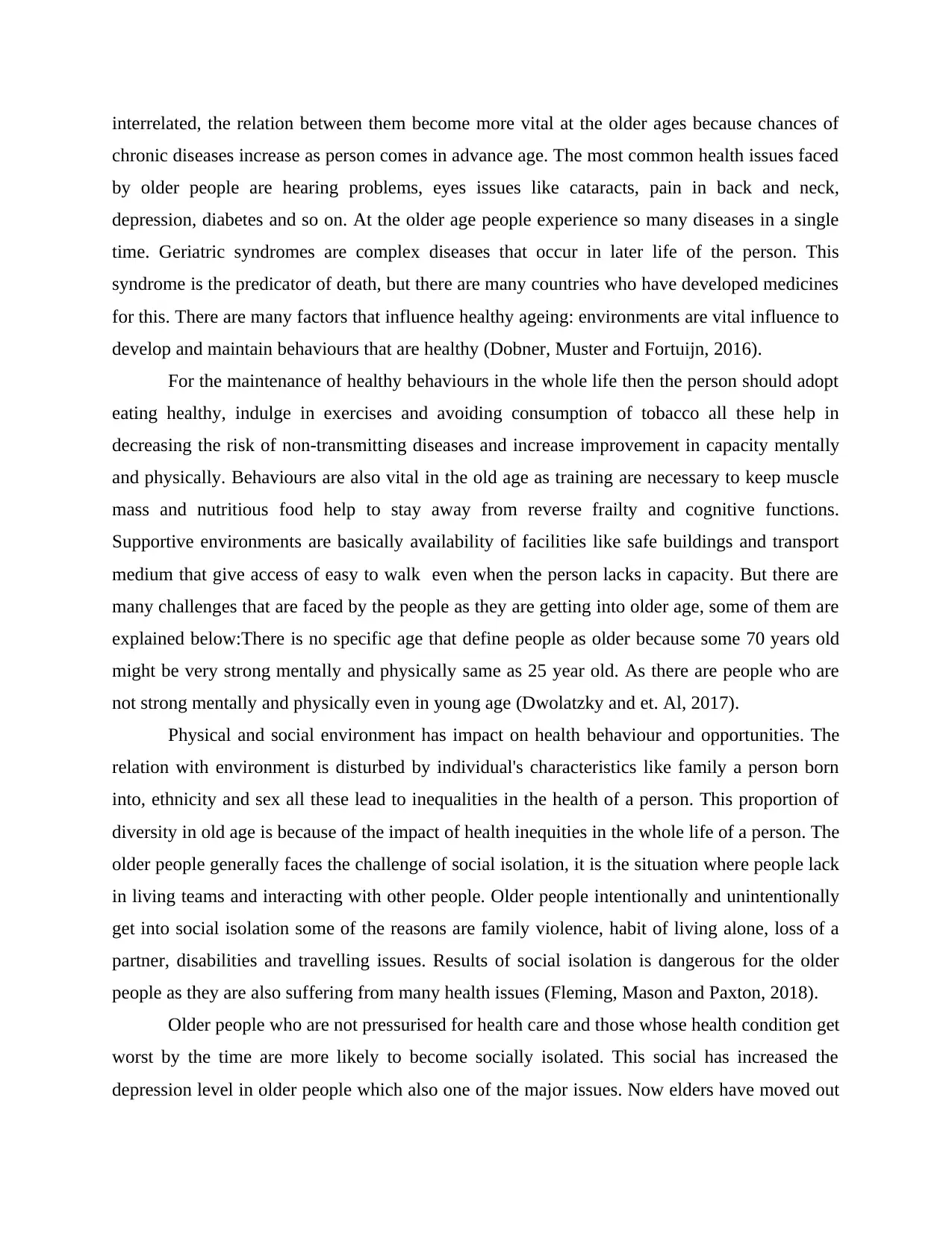
interrelated, the relation between them become more vital at the older ages because chances of
chronic diseases increase as person comes in advance age. The most common health issues faced
by older people are hearing problems, eyes issues like cataracts, pain in back and neck,
depression, diabetes and so on. At the older age people experience so many diseases in a single
time. Geriatric syndromes are complex diseases that occur in later life of the person. This
syndrome is the predicator of death, but there are many countries who have developed medicines
for this. There are many factors that influence healthy ageing: environments are vital influence to
develop and maintain behaviours that are healthy (Dobner, Muster and Fortuijn, 2016).
For the maintenance of healthy behaviours in the whole life then the person should adopt
eating healthy, indulge in exercises and avoiding consumption of tobacco all these help in
decreasing the risk of non-transmitting diseases and increase improvement in capacity mentally
and physically. Behaviours are also vital in the old age as training are necessary to keep muscle
mass and nutritious food help to stay away from reverse frailty and cognitive functions.
Supportive environments are basically availability of facilities like safe buildings and transport
medium that give access of easy to walk even when the person lacks in capacity. But there are
many challenges that are faced by the people as they are getting into older age, some of them are
explained below:There is no specific age that define people as older because some 70 years old
might be very strong mentally and physically same as 25 year old. As there are people who are
not strong mentally and physically even in young age (Dwolatzky and et. Al, 2017).
Physical and social environment has impact on health behaviour and opportunities. The
relation with environment is disturbed by individual's characteristics like family a person born
into, ethnicity and sex all these lead to inequalities in the health of a person. This proportion of
diversity in old age is because of the impact of health inequities in the whole life of a person. The
older people generally faces the challenge of social isolation, it is the situation where people lack
in living teams and interacting with other people. Older people intentionally and unintentionally
get into social isolation some of the reasons are family violence, habit of living alone, loss of a
partner, disabilities and travelling issues. Results of social isolation is dangerous for the older
people as they are also suffering from many health issues (Fleming, Mason and Paxton, 2018).
Older people who are not pressurised for health care and those whose health condition get
worst by the time are more likely to become socially isolated. This social has increased the
depression level in older people which also one of the major issues. Now elders have moved out
chronic diseases increase as person comes in advance age. The most common health issues faced
by older people are hearing problems, eyes issues like cataracts, pain in back and neck,
depression, diabetes and so on. At the older age people experience so many diseases in a single
time. Geriatric syndromes are complex diseases that occur in later life of the person. This
syndrome is the predicator of death, but there are many countries who have developed medicines
for this. There are many factors that influence healthy ageing: environments are vital influence to
develop and maintain behaviours that are healthy (Dobner, Muster and Fortuijn, 2016).
For the maintenance of healthy behaviours in the whole life then the person should adopt
eating healthy, indulge in exercises and avoiding consumption of tobacco all these help in
decreasing the risk of non-transmitting diseases and increase improvement in capacity mentally
and physically. Behaviours are also vital in the old age as training are necessary to keep muscle
mass and nutritious food help to stay away from reverse frailty and cognitive functions.
Supportive environments are basically availability of facilities like safe buildings and transport
medium that give access of easy to walk even when the person lacks in capacity. But there are
many challenges that are faced by the people as they are getting into older age, some of them are
explained below:There is no specific age that define people as older because some 70 years old
might be very strong mentally and physically same as 25 year old. As there are people who are
not strong mentally and physically even in young age (Dwolatzky and et. Al, 2017).
Physical and social environment has impact on health behaviour and opportunities. The
relation with environment is disturbed by individual's characteristics like family a person born
into, ethnicity and sex all these lead to inequalities in the health of a person. This proportion of
diversity in old age is because of the impact of health inequities in the whole life of a person. The
older people generally faces the challenge of social isolation, it is the situation where people lack
in living teams and interacting with other people. Older people intentionally and unintentionally
get into social isolation some of the reasons are family violence, habit of living alone, loss of a
partner, disabilities and travelling issues. Results of social isolation is dangerous for the older
people as they are also suffering from many health issues (Fleming, Mason and Paxton, 2018).
Older people who are not pressurised for health care and those whose health condition get
worst by the time are more likely to become socially isolated. This social has increased the
depression level in older people which also one of the major issues. Now elders have moved out
Paraphrase This Document
Need a fresh take? Get an instant paraphrase of this document with our AI Paraphraser
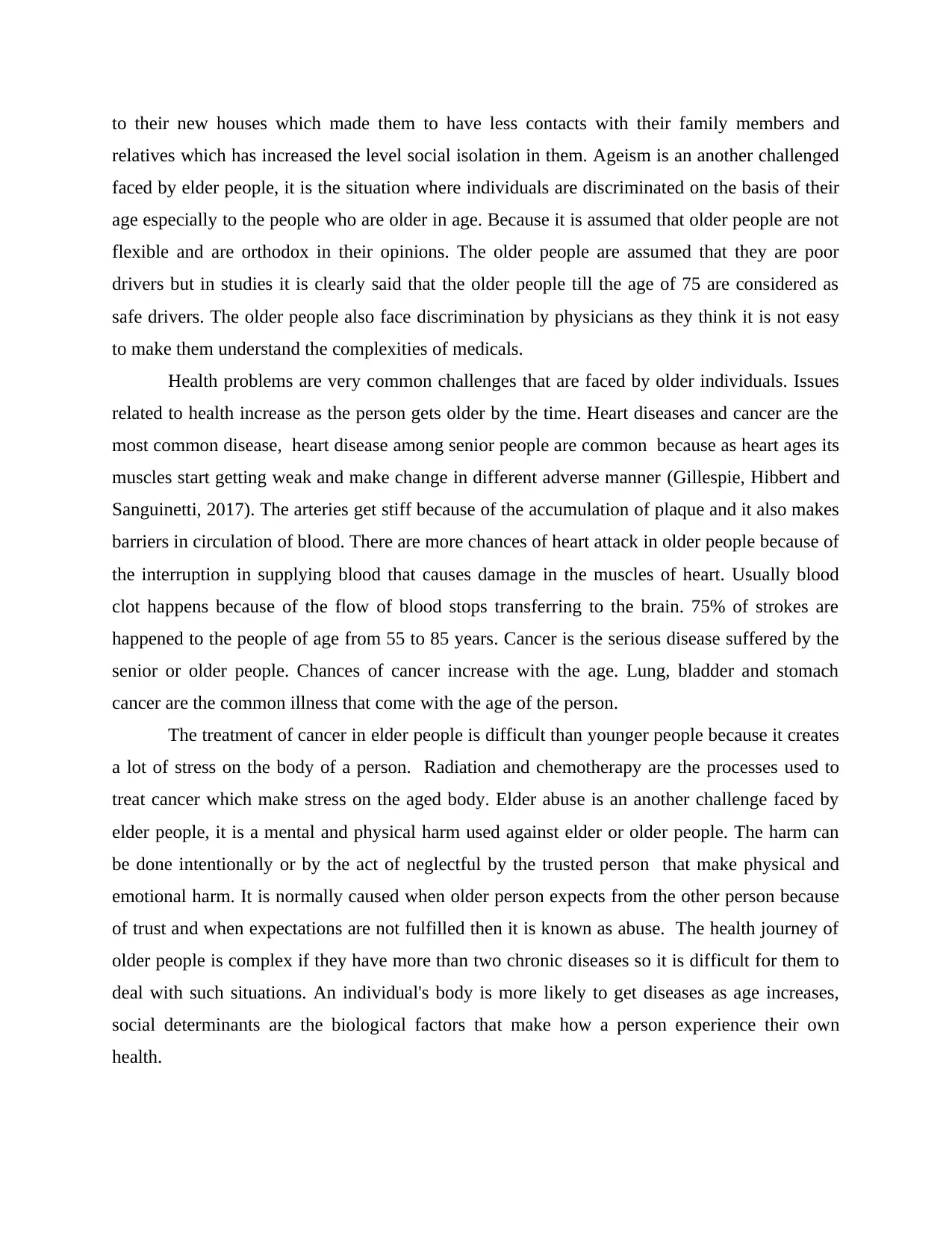
to their new houses which made them to have less contacts with their family members and
relatives which has increased the level social isolation in them. Ageism is an another challenged
faced by elder people, it is the situation where individuals are discriminated on the basis of their
age especially to the people who are older in age. Because it is assumed that older people are not
flexible and are orthodox in their opinions. The older people are assumed that they are poor
drivers but in studies it is clearly said that the older people till the age of 75 are considered as
safe drivers. The older people also face discrimination by physicians as they think it is not easy
to make them understand the complexities of medicals.
Health problems are very common challenges that are faced by older individuals. Issues
related to health increase as the person gets older by the time. Heart diseases and cancer are the
most common disease, heart disease among senior people are common because as heart ages its
muscles start getting weak and make change in different adverse manner (Gillespie, Hibbert and
Sanguinetti, 2017). The arteries get stiff because of the accumulation of plaque and it also makes
barriers in circulation of blood. There are more chances of heart attack in older people because of
the interruption in supplying blood that causes damage in the muscles of heart. Usually blood
clot happens because of the flow of blood stops transferring to the brain. 75% of strokes are
happened to the people of age from 55 to 85 years. Cancer is the serious disease suffered by the
senior or older people. Chances of cancer increase with the age. Lung, bladder and stomach
cancer are the common illness that come with the age of the person.
The treatment of cancer in elder people is difficult than younger people because it creates
a lot of stress on the body of a person. Radiation and chemotherapy are the processes used to
treat cancer which make stress on the aged body. Elder abuse is an another challenge faced by
elder people, it is a mental and physical harm used against elder or older people. The harm can
be done intentionally or by the act of neglectful by the trusted person that make physical and
emotional harm. It is normally caused when older person expects from the other person because
of trust and when expectations are not fulfilled then it is known as abuse. The health journey of
older people is complex if they have more than two chronic diseases so it is difficult for them to
deal with such situations. An individual's body is more likely to get diseases as age increases,
social determinants are the biological factors that make how a person experience their own
health.
relatives which has increased the level social isolation in them. Ageism is an another challenged
faced by elder people, it is the situation where individuals are discriminated on the basis of their
age especially to the people who are older in age. Because it is assumed that older people are not
flexible and are orthodox in their opinions. The older people are assumed that they are poor
drivers but in studies it is clearly said that the older people till the age of 75 are considered as
safe drivers. The older people also face discrimination by physicians as they think it is not easy
to make them understand the complexities of medicals.
Health problems are very common challenges that are faced by older individuals. Issues
related to health increase as the person gets older by the time. Heart diseases and cancer are the
most common disease, heart disease among senior people are common because as heart ages its
muscles start getting weak and make change in different adverse manner (Gillespie, Hibbert and
Sanguinetti, 2017). The arteries get stiff because of the accumulation of plaque and it also makes
barriers in circulation of blood. There are more chances of heart attack in older people because of
the interruption in supplying blood that causes damage in the muscles of heart. Usually blood
clot happens because of the flow of blood stops transferring to the brain. 75% of strokes are
happened to the people of age from 55 to 85 years. Cancer is the serious disease suffered by the
senior or older people. Chances of cancer increase with the age. Lung, bladder and stomach
cancer are the common illness that come with the age of the person.
The treatment of cancer in elder people is difficult than younger people because it creates
a lot of stress on the body of a person. Radiation and chemotherapy are the processes used to
treat cancer which make stress on the aged body. Elder abuse is an another challenge faced by
elder people, it is a mental and physical harm used against elder or older people. The harm can
be done intentionally or by the act of neglectful by the trusted person that make physical and
emotional harm. It is normally caused when older person expects from the other person because
of trust and when expectations are not fulfilled then it is known as abuse. The health journey of
older people is complex if they have more than two chronic diseases so it is difficult for them to
deal with such situations. An individual's body is more likely to get diseases as age increases,
social determinants are the biological factors that make how a person experience their own
health.
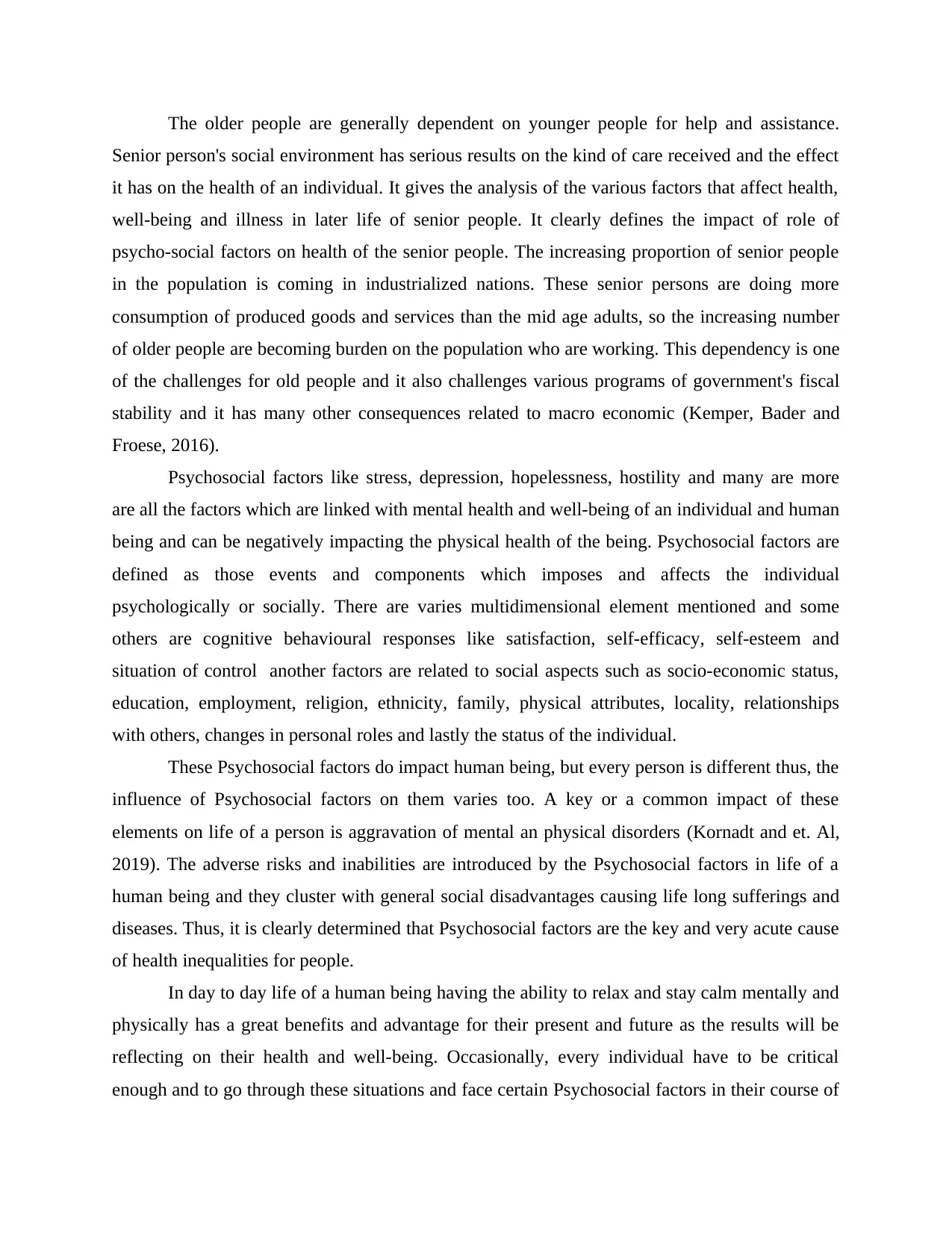
The older people are generally dependent on younger people for help and assistance.
Senior person's social environment has serious results on the kind of care received and the effect
it has on the health of an individual. It gives the analysis of the various factors that affect health,
well-being and illness in later life of senior people. It clearly defines the impact of role of
psycho-social factors on health of the senior people. The increasing proportion of senior people
in the population is coming in industrialized nations. These senior persons are doing more
consumption of produced goods and services than the mid age adults, so the increasing number
of older people are becoming burden on the population who are working. This dependency is one
of the challenges for old people and it also challenges various programs of government's fiscal
stability and it has many other consequences related to macro economic (Kemper, Bader and
Froese, 2016).
Psychosocial factors like stress, depression, hopelessness, hostility and many are more
are all the factors which are linked with mental health and well-being of an individual and human
being and can be negatively impacting the physical health of the being. Psychosocial factors are
defined as those events and components which imposes and affects the individual
psychologically or socially. There are varies multidimensional element mentioned and some
others are cognitive behavioural responses like satisfaction, self-efficacy, self-esteem and
situation of control another factors are related to social aspects such as socio-economic status,
education, employment, religion, ethnicity, family, physical attributes, locality, relationships
with others, changes in personal roles and lastly the status of the individual.
These Psychosocial factors do impact human being, but every person is different thus, the
influence of Psychosocial factors on them varies too. A key or a common impact of these
elements on life of a person is aggravation of mental an physical disorders (Kornadt and et. Al,
2019). The adverse risks and inabilities are introduced by the Psychosocial factors in life of a
human being and they cluster with general social disadvantages causing life long sufferings and
diseases. Thus, it is clearly determined that Psychosocial factors are the key and very acute cause
of health inequalities for people.
In day to day life of a human being having the ability to relax and stay calm mentally and
physically has a great benefits and advantage for their present and future as the results will be
reflecting on their health and well-being. Occasionally, every individual have to be critical
enough and to go through these situations and face certain Psychosocial factors in their course of
Senior person's social environment has serious results on the kind of care received and the effect
it has on the health of an individual. It gives the analysis of the various factors that affect health,
well-being and illness in later life of senior people. It clearly defines the impact of role of
psycho-social factors on health of the senior people. The increasing proportion of senior people
in the population is coming in industrialized nations. These senior persons are doing more
consumption of produced goods and services than the mid age adults, so the increasing number
of older people are becoming burden on the population who are working. This dependency is one
of the challenges for old people and it also challenges various programs of government's fiscal
stability and it has many other consequences related to macro economic (Kemper, Bader and
Froese, 2016).
Psychosocial factors like stress, depression, hopelessness, hostility and many are more
are all the factors which are linked with mental health and well-being of an individual and human
being and can be negatively impacting the physical health of the being. Psychosocial factors are
defined as those events and components which imposes and affects the individual
psychologically or socially. There are varies multidimensional element mentioned and some
others are cognitive behavioural responses like satisfaction, self-efficacy, self-esteem and
situation of control another factors are related to social aspects such as socio-economic status,
education, employment, religion, ethnicity, family, physical attributes, locality, relationships
with others, changes in personal roles and lastly the status of the individual.
These Psychosocial factors do impact human being, but every person is different thus, the
influence of Psychosocial factors on them varies too. A key or a common impact of these
elements on life of a person is aggravation of mental an physical disorders (Kornadt and et. Al,
2019). The adverse risks and inabilities are introduced by the Psychosocial factors in life of a
human being and they cluster with general social disadvantages causing life long sufferings and
diseases. Thus, it is clearly determined that Psychosocial factors are the key and very acute cause
of health inequalities for people.
In day to day life of a human being having the ability to relax and stay calm mentally and
physically has a great benefits and advantage for their present and future as the results will be
reflecting on their health and well-being. Occasionally, every individual have to be critical
enough and to go through these situations and face certain Psychosocial factors in their course of
⊘ This is a preview!⊘
Do you want full access?
Subscribe today to unlock all pages.

Trusted by 1+ million students worldwide
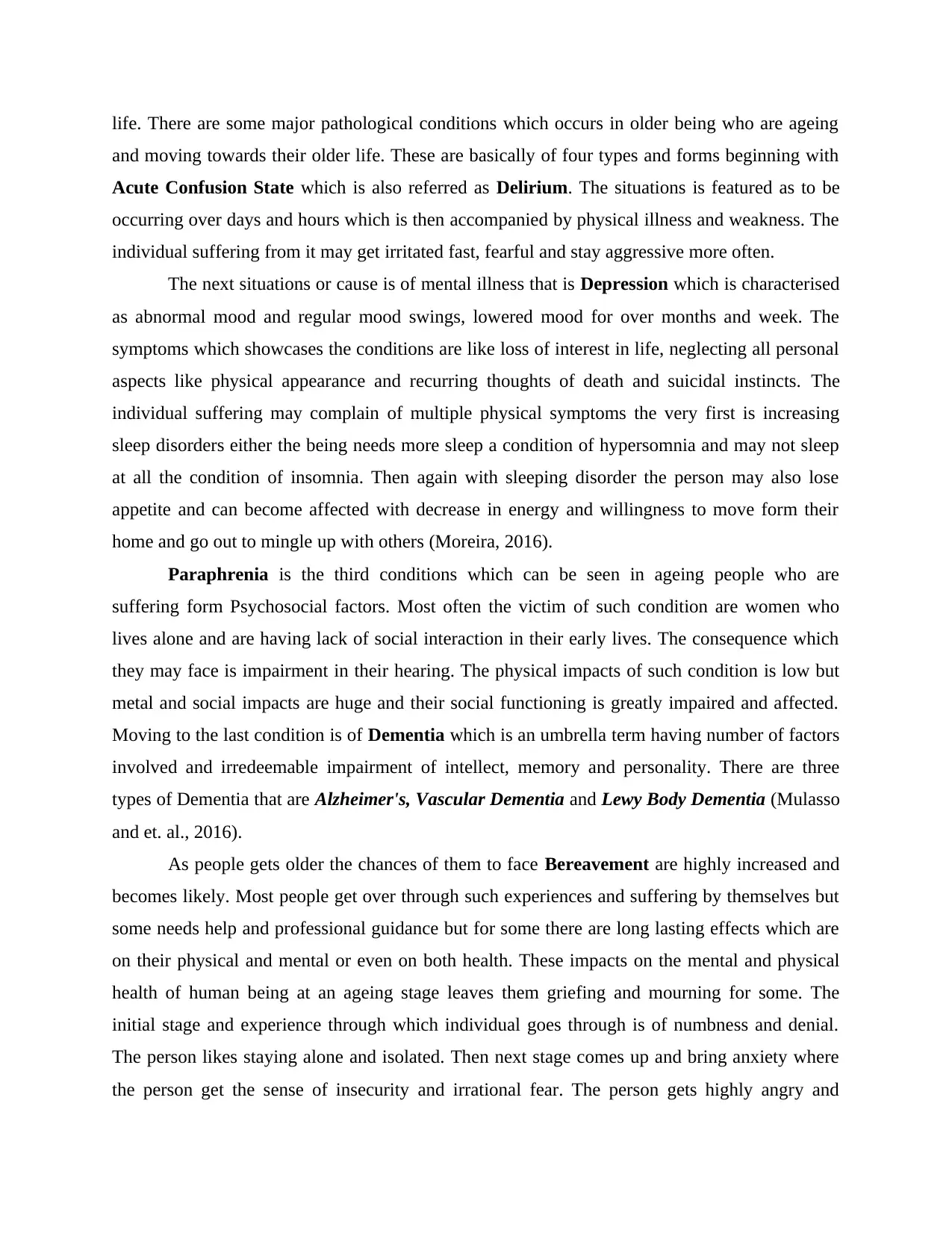
life. There are some major pathological conditions which occurs in older being who are ageing
and moving towards their older life. These are basically of four types and forms beginning with
Acute Confusion State which is also referred as Delirium. The situations is featured as to be
occurring over days and hours which is then accompanied by physical illness and weakness. The
individual suffering from it may get irritated fast, fearful and stay aggressive more often.
The next situations or cause is of mental illness that is Depression which is characterised
as abnormal mood and regular mood swings, lowered mood for over months and week. The
symptoms which showcases the conditions are like loss of interest in life, neglecting all personal
aspects like physical appearance and recurring thoughts of death and suicidal instincts. The
individual suffering may complain of multiple physical symptoms the very first is increasing
sleep disorders either the being needs more sleep a condition of hypersomnia and may not sleep
at all the condition of insomnia. Then again with sleeping disorder the person may also lose
appetite and can become affected with decrease in energy and willingness to move form their
home and go out to mingle up with others (Moreira, 2016).
Paraphrenia is the third conditions which can be seen in ageing people who are
suffering form Psychosocial factors. Most often the victim of such condition are women who
lives alone and are having lack of social interaction in their early lives. The consequence which
they may face is impairment in their hearing. The physical impacts of such condition is low but
metal and social impacts are huge and their social functioning is greatly impaired and affected.
Moving to the last condition is of Dementia which is an umbrella term having number of factors
involved and irredeemable impairment of intellect, memory and personality. There are three
types of Dementia that are Alzheimer's, Vascular Dementia and Lewy Body Dementia (Mulasso
and et. al., 2016).
As people gets older the chances of them to face Bereavement are highly increased and
becomes likely. Most people get over through such experiences and suffering by themselves but
some needs help and professional guidance but for some there are long lasting effects which are
on their physical and mental or even on both health. These impacts on the mental and physical
health of human being at an ageing stage leaves them griefing and mourning for some. The
initial stage and experience through which individual goes through is of numbness and denial.
The person likes staying alone and isolated. Then next stage comes up and bring anxiety where
the person get the sense of insecurity and irrational fear. The person gets highly angry and
and moving towards their older life. These are basically of four types and forms beginning with
Acute Confusion State which is also referred as Delirium. The situations is featured as to be
occurring over days and hours which is then accompanied by physical illness and weakness. The
individual suffering from it may get irritated fast, fearful and stay aggressive more often.
The next situations or cause is of mental illness that is Depression which is characterised
as abnormal mood and regular mood swings, lowered mood for over months and week. The
symptoms which showcases the conditions are like loss of interest in life, neglecting all personal
aspects like physical appearance and recurring thoughts of death and suicidal instincts. The
individual suffering may complain of multiple physical symptoms the very first is increasing
sleep disorders either the being needs more sleep a condition of hypersomnia and may not sleep
at all the condition of insomnia. Then again with sleeping disorder the person may also lose
appetite and can become affected with decrease in energy and willingness to move form their
home and go out to mingle up with others (Moreira, 2016).
Paraphrenia is the third conditions which can be seen in ageing people who are
suffering form Psychosocial factors. Most often the victim of such condition are women who
lives alone and are having lack of social interaction in their early lives. The consequence which
they may face is impairment in their hearing. The physical impacts of such condition is low but
metal and social impacts are huge and their social functioning is greatly impaired and affected.
Moving to the last condition is of Dementia which is an umbrella term having number of factors
involved and irredeemable impairment of intellect, memory and personality. There are three
types of Dementia that are Alzheimer's, Vascular Dementia and Lewy Body Dementia (Mulasso
and et. al., 2016).
As people gets older the chances of them to face Bereavement are highly increased and
becomes likely. Most people get over through such experiences and suffering by themselves but
some needs help and professional guidance but for some there are long lasting effects which are
on their physical and mental or even on both health. These impacts on the mental and physical
health of human being at an ageing stage leaves them griefing and mourning for some. The
initial stage and experience through which individual goes through is of numbness and denial.
The person likes staying alone and isolated. Then next stage comes up and bring anxiety where
the person get the sense of insecurity and irrational fear. The person gets highly angry and
Paraphrase This Document
Need a fresh take? Get an instant paraphrase of this document with our AI Paraphraser
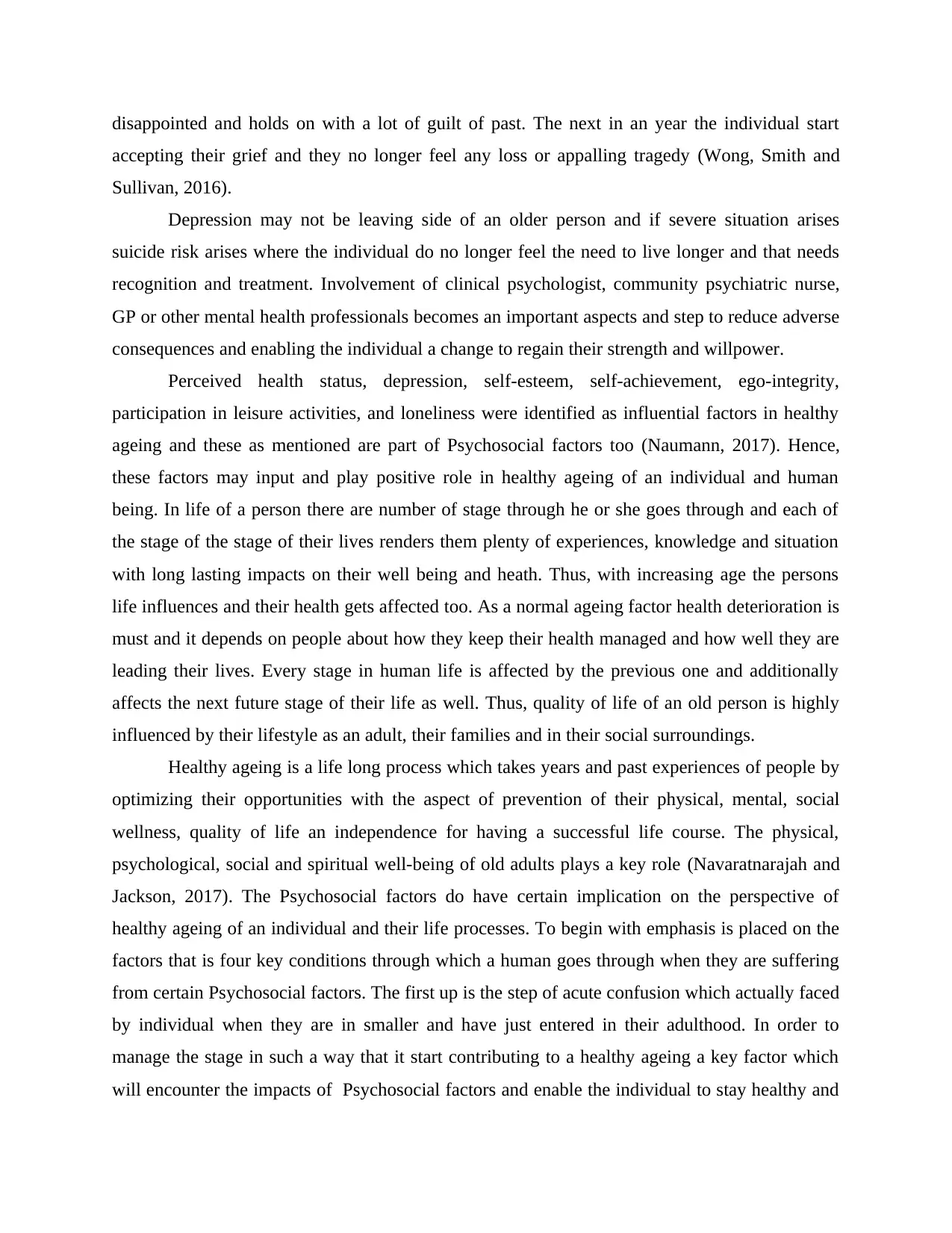
disappointed and holds on with a lot of guilt of past. The next in an year the individual start
accepting their grief and they no longer feel any loss or appalling tragedy (Wong, Smith and
Sullivan, 2016).
Depression may not be leaving side of an older person and if severe situation arises
suicide risk arises where the individual do no longer feel the need to live longer and that needs
recognition and treatment. Involvement of clinical psychologist, community psychiatric nurse,
GP or other mental health professionals becomes an important aspects and step to reduce adverse
consequences and enabling the individual a change to regain their strength and willpower.
Perceived health status, depression, self-esteem, self-achievement, ego-integrity,
participation in leisure activities, and loneliness were identified as influential factors in healthy
ageing and these as mentioned are part of Psychosocial factors too (Naumann, 2017). Hence,
these factors may input and play positive role in healthy ageing of an individual and human
being. In life of a person there are number of stage through he or she goes through and each of
the stage of the stage of their lives renders them plenty of experiences, knowledge and situation
with long lasting impacts on their well being and heath. Thus, with increasing age the persons
life influences and their health gets affected too. As a normal ageing factor health deterioration is
must and it depends on people about how they keep their health managed and how well they are
leading their lives. Every stage in human life is affected by the previous one and additionally
affects the next future stage of their life as well. Thus, quality of life of an old person is highly
influenced by their lifestyle as an adult, their families and in their social surroundings.
Healthy ageing is a life long process which takes years and past experiences of people by
optimizing their opportunities with the aspect of prevention of their physical, mental, social
wellness, quality of life an independence for having a successful life course. The physical,
psychological, social and spiritual well-being of old adults plays a key role (Navaratnarajah and
Jackson, 2017). The Psychosocial factors do have certain implication on the perspective of
healthy ageing of an individual and their life processes. To begin with emphasis is placed on the
factors that is four key conditions through which a human goes through when they are suffering
from certain Psychosocial factors. The first up is the step of acute confusion which actually faced
by individual when they are in smaller and have just entered in their adulthood. In order to
manage the stage in such a way that it start contributing to a healthy ageing a key factor which
will encounter the impacts of Psychosocial factors and enable the individual to stay healthy and
accepting their grief and they no longer feel any loss or appalling tragedy (Wong, Smith and
Sullivan, 2016).
Depression may not be leaving side of an older person and if severe situation arises
suicide risk arises where the individual do no longer feel the need to live longer and that needs
recognition and treatment. Involvement of clinical psychologist, community psychiatric nurse,
GP or other mental health professionals becomes an important aspects and step to reduce adverse
consequences and enabling the individual a change to regain their strength and willpower.
Perceived health status, depression, self-esteem, self-achievement, ego-integrity,
participation in leisure activities, and loneliness were identified as influential factors in healthy
ageing and these as mentioned are part of Psychosocial factors too (Naumann, 2017). Hence,
these factors may input and play positive role in healthy ageing of an individual and human
being. In life of a person there are number of stage through he or she goes through and each of
the stage of the stage of their lives renders them plenty of experiences, knowledge and situation
with long lasting impacts on their well being and heath. Thus, with increasing age the persons
life influences and their health gets affected too. As a normal ageing factor health deterioration is
must and it depends on people about how they keep their health managed and how well they are
leading their lives. Every stage in human life is affected by the previous one and additionally
affects the next future stage of their life as well. Thus, quality of life of an old person is highly
influenced by their lifestyle as an adult, their families and in their social surroundings.
Healthy ageing is a life long process which takes years and past experiences of people by
optimizing their opportunities with the aspect of prevention of their physical, mental, social
wellness, quality of life an independence for having a successful life course. The physical,
psychological, social and spiritual well-being of old adults plays a key role (Navaratnarajah and
Jackson, 2017). The Psychosocial factors do have certain implication on the perspective of
healthy ageing of an individual and their life processes. To begin with emphasis is placed on the
factors that is four key conditions through which a human goes through when they are suffering
from certain Psychosocial factors. The first up is the step of acute confusion which actually faced
by individual when they are in smaller and have just entered in their adulthood. In order to
manage the stage in such a way that it start contributing to a healthy ageing a key factor which
will encounter the impacts of Psychosocial factors and enable the individual to stay healthy and
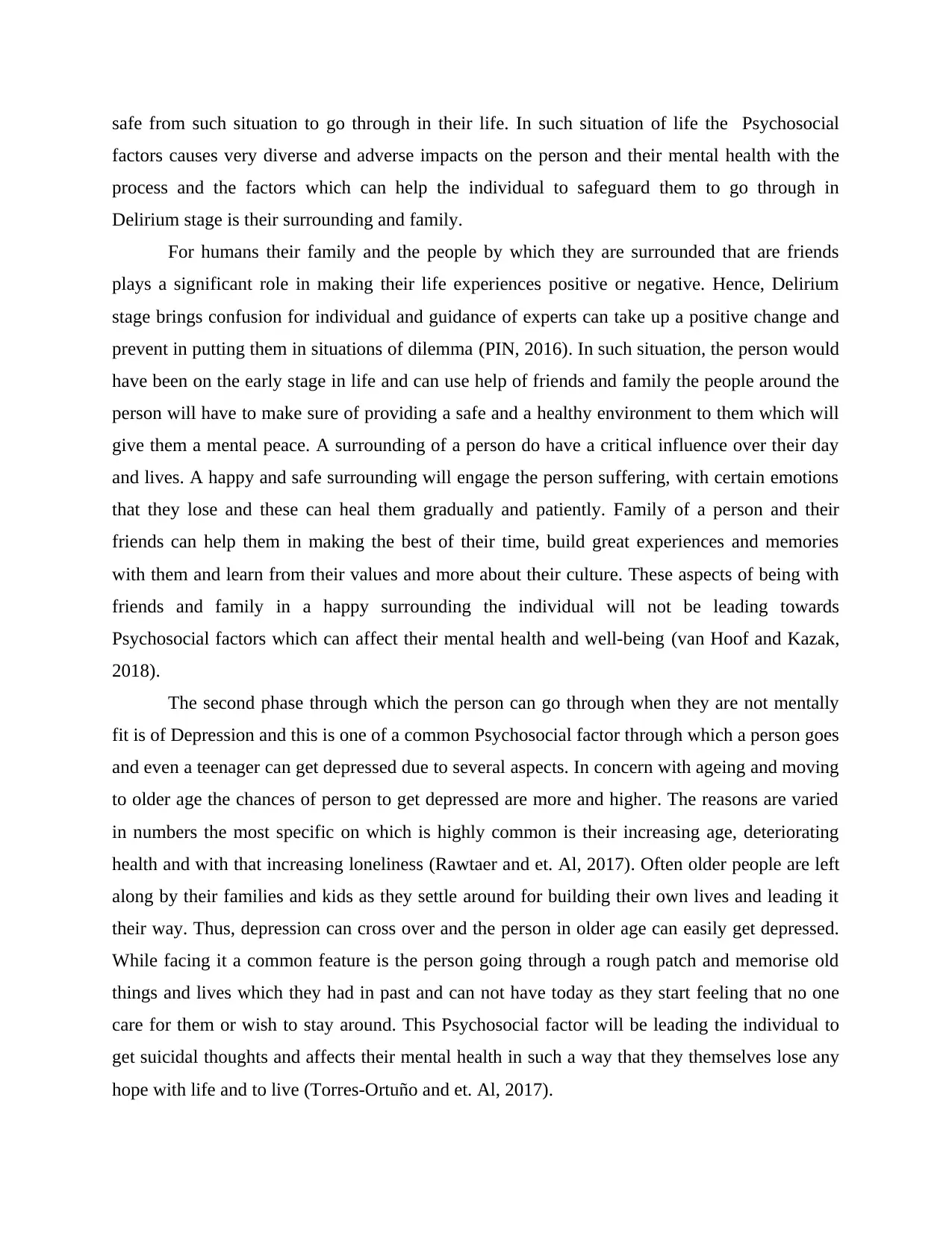
safe from such situation to go through in their life. In such situation of life the Psychosocial
factors causes very diverse and adverse impacts on the person and their mental health with the
process and the factors which can help the individual to safeguard them to go through in
Delirium stage is their surrounding and family.
For humans their family and the people by which they are surrounded that are friends
plays a significant role in making their life experiences positive or negative. Hence, Delirium
stage brings confusion for individual and guidance of experts can take up a positive change and
prevent in putting them in situations of dilemma (PIN, 2016). In such situation, the person would
have been on the early stage in life and can use help of friends and family the people around the
person will have to make sure of providing a safe and a healthy environment to them which will
give them a mental peace. A surrounding of a person do have a critical influence over their day
and lives. A happy and safe surrounding will engage the person suffering, with certain emotions
that they lose and these can heal them gradually and patiently. Family of a person and their
friends can help them in making the best of their time, build great experiences and memories
with them and learn from their values and more about their culture. These aspects of being with
friends and family in a happy surrounding the individual will not be leading towards
Psychosocial factors which can affect their mental health and well-being (van Hoof and Kazak,
2018).
The second phase through which the person can go through when they are not mentally
fit is of Depression and this is one of a common Psychosocial factor through which a person goes
and even a teenager can get depressed due to several aspects. In concern with ageing and moving
to older age the chances of person to get depressed are more and higher. The reasons are varied
in numbers the most specific on which is highly common is their increasing age, deteriorating
health and with that increasing loneliness (Rawtaer and et. Al, 2017). Often older people are left
along by their families and kids as they settle around for building their own lives and leading it
their way. Thus, depression can cross over and the person in older age can easily get depressed.
While facing it a common feature is the person going through a rough patch and memorise old
things and lives which they had in past and can not have today as they start feeling that no one
care for them or wish to stay around. This Psychosocial factor will be leading the individual to
get suicidal thoughts and affects their mental health in such a way that they themselves lose any
hope with life and to live (Torres‐Ortuño and et. Al, 2017).
factors causes very diverse and adverse impacts on the person and their mental health with the
process and the factors which can help the individual to safeguard them to go through in
Delirium stage is their surrounding and family.
For humans their family and the people by which they are surrounded that are friends
plays a significant role in making their life experiences positive or negative. Hence, Delirium
stage brings confusion for individual and guidance of experts can take up a positive change and
prevent in putting them in situations of dilemma (PIN, 2016). In such situation, the person would
have been on the early stage in life and can use help of friends and family the people around the
person will have to make sure of providing a safe and a healthy environment to them which will
give them a mental peace. A surrounding of a person do have a critical influence over their day
and lives. A happy and safe surrounding will engage the person suffering, with certain emotions
that they lose and these can heal them gradually and patiently. Family of a person and their
friends can help them in making the best of their time, build great experiences and memories
with them and learn from their values and more about their culture. These aspects of being with
friends and family in a happy surrounding the individual will not be leading towards
Psychosocial factors which can affect their mental health and well-being (van Hoof and Kazak,
2018).
The second phase through which the person can go through when they are not mentally
fit is of Depression and this is one of a common Psychosocial factor through which a person goes
and even a teenager can get depressed due to several aspects. In concern with ageing and moving
to older age the chances of person to get depressed are more and higher. The reasons are varied
in numbers the most specific on which is highly common is their increasing age, deteriorating
health and with that increasing loneliness (Rawtaer and et. Al, 2017). Often older people are left
along by their families and kids as they settle around for building their own lives and leading it
their way. Thus, depression can cross over and the person in older age can easily get depressed.
While facing it a common feature is the person going through a rough patch and memorise old
things and lives which they had in past and can not have today as they start feeling that no one
care for them or wish to stay around. This Psychosocial factor will be leading the individual to
get suicidal thoughts and affects their mental health in such a way that they themselves lose any
hope with life and to live (Torres‐Ortuño and et. Al, 2017).
⊘ This is a preview!⊘
Do you want full access?
Subscribe today to unlock all pages.

Trusted by 1+ million students worldwide
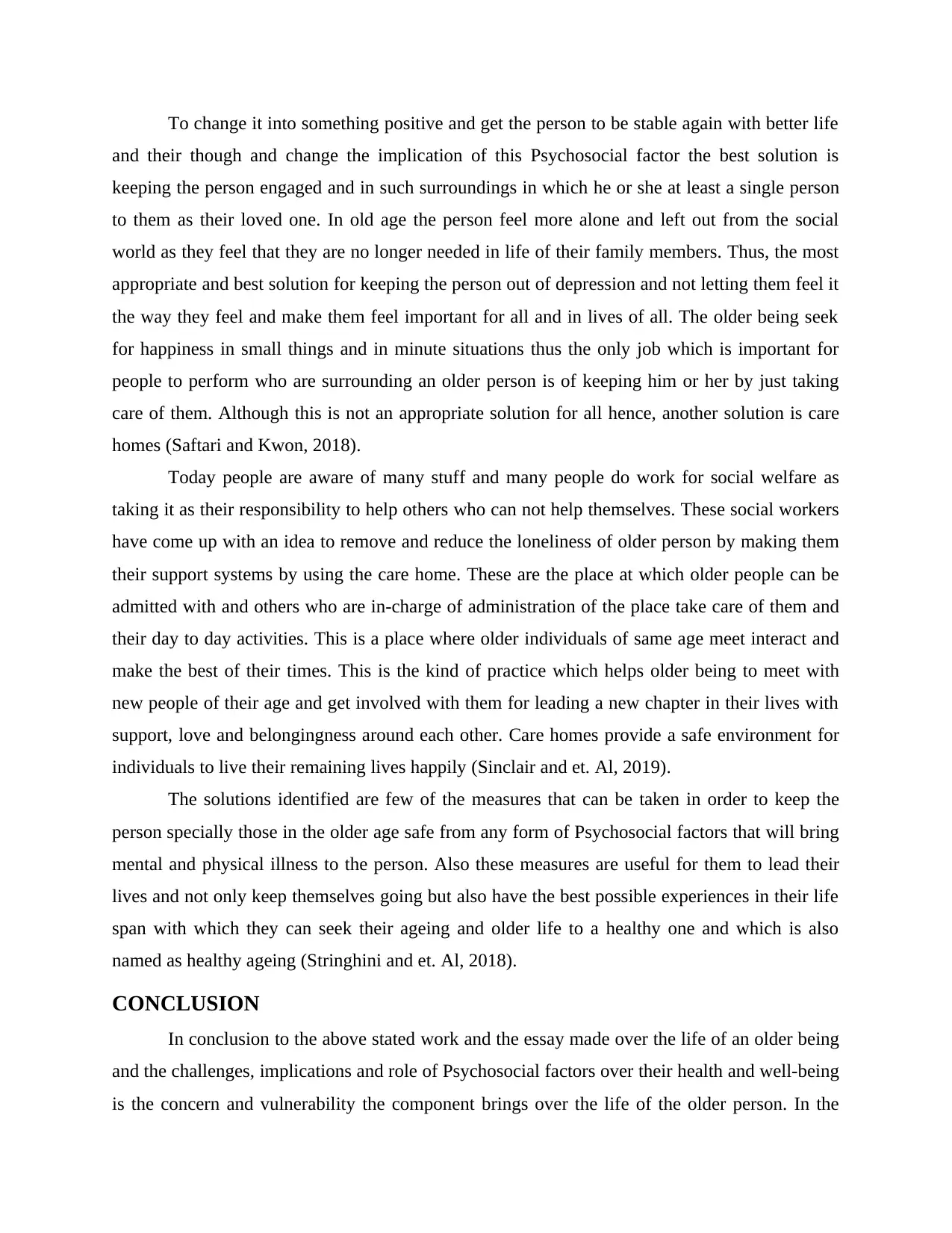
To change it into something positive and get the person to be stable again with better life
and their though and change the implication of this Psychosocial factor the best solution is
keeping the person engaged and in such surroundings in which he or she at least a single person
to them as their loved one. In old age the person feel more alone and left out from the social
world as they feel that they are no longer needed in life of their family members. Thus, the most
appropriate and best solution for keeping the person out of depression and not letting them feel it
the way they feel and make them feel important for all and in lives of all. The older being seek
for happiness in small things and in minute situations thus the only job which is important for
people to perform who are surrounding an older person is of keeping him or her by just taking
care of them. Although this is not an appropriate solution for all hence, another solution is care
homes (Saftari and Kwon, 2018).
Today people are aware of many stuff and many people do work for social welfare as
taking it as their responsibility to help others who can not help themselves. These social workers
have come up with an idea to remove and reduce the loneliness of older person by making them
their support systems by using the care home. These are the place at which older people can be
admitted with and others who are in-charge of administration of the place take care of them and
their day to day activities. This is a place where older individuals of same age meet interact and
make the best of their times. This is the kind of practice which helps older being to meet with
new people of their age and get involved with them for leading a new chapter in their lives with
support, love and belongingness around each other. Care homes provide a safe environment for
individuals to live their remaining lives happily (Sinclair and et. Al, 2019).
The solutions identified are few of the measures that can be taken in order to keep the
person specially those in the older age safe from any form of Psychosocial factors that will bring
mental and physical illness to the person. Also these measures are useful for them to lead their
lives and not only keep themselves going but also have the best possible experiences in their life
span with which they can seek their ageing and older life to a healthy one and which is also
named as healthy ageing (Stringhini and et. Al, 2018).
CONCLUSION
In conclusion to the above stated work and the essay made over the life of an older being
and the challenges, implications and role of Psychosocial factors over their health and well-being
is the concern and vulnerability the component brings over the life of the older person. In the
and their though and change the implication of this Psychosocial factor the best solution is
keeping the person engaged and in such surroundings in which he or she at least a single person
to them as their loved one. In old age the person feel more alone and left out from the social
world as they feel that they are no longer needed in life of their family members. Thus, the most
appropriate and best solution for keeping the person out of depression and not letting them feel it
the way they feel and make them feel important for all and in lives of all. The older being seek
for happiness in small things and in minute situations thus the only job which is important for
people to perform who are surrounding an older person is of keeping him or her by just taking
care of them. Although this is not an appropriate solution for all hence, another solution is care
homes (Saftari and Kwon, 2018).
Today people are aware of many stuff and many people do work for social welfare as
taking it as their responsibility to help others who can not help themselves. These social workers
have come up with an idea to remove and reduce the loneliness of older person by making them
their support systems by using the care home. These are the place at which older people can be
admitted with and others who are in-charge of administration of the place take care of them and
their day to day activities. This is a place where older individuals of same age meet interact and
make the best of their times. This is the kind of practice which helps older being to meet with
new people of their age and get involved with them for leading a new chapter in their lives with
support, love and belongingness around each other. Care homes provide a safe environment for
individuals to live their remaining lives happily (Sinclair and et. Al, 2019).
The solutions identified are few of the measures that can be taken in order to keep the
person specially those in the older age safe from any form of Psychosocial factors that will bring
mental and physical illness to the person. Also these measures are useful for them to lead their
lives and not only keep themselves going but also have the best possible experiences in their life
span with which they can seek their ageing and older life to a healthy one and which is also
named as healthy ageing (Stringhini and et. Al, 2018).
CONCLUSION
In conclusion to the above stated work and the essay made over the life of an older being
and the challenges, implications and role of Psychosocial factors over their health and well-being
is the concern and vulnerability the component brings over the life of the older person. In the
Paraphrase This Document
Need a fresh take? Get an instant paraphrase of this document with our AI Paraphraser

essay challenges, roles and implications of the psychosocial factors are determined according to
which the older being gets affected as their lives have changed and life stage through they are
going through have made them weak due to older age and their lives experiences.
which the older being gets affected as their lives have changed and life stage through they are
going through have made them weak due to older age and their lives experiences.
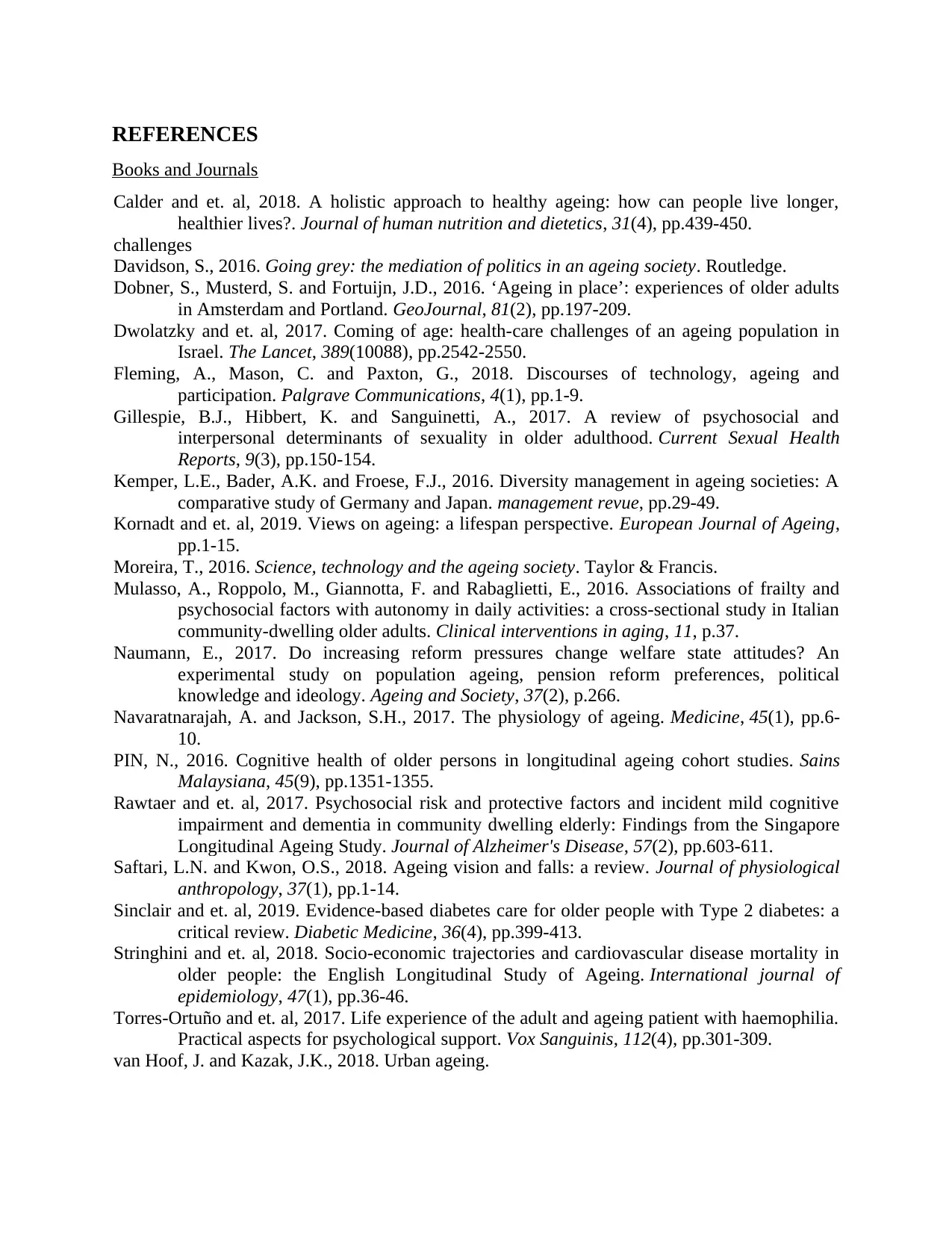
REFERENCES
Books and Journals
Calder and et. al, 2018. A holistic approach to healthy ageing: how can people live longer,
healthier lives?. Journal of human nutrition and dietetics, 31(4), pp.439-450.
challenges
Davidson, S., 2016. Going grey: the mediation of politics in an ageing society. Routledge.
Dobner, S., Musterd, S. and Fortuijn, J.D., 2016. ‘Ageing in place’: experiences of older adults
in Amsterdam and Portland. GeoJournal, 81(2), pp.197-209.
Dwolatzky and et. al, 2017. Coming of age: health-care challenges of an ageing population in
Israel. The Lancet, 389(10088), pp.2542-2550.
Fleming, A., Mason, C. and Paxton, G., 2018. Discourses of technology, ageing and
participation. Palgrave Communications, 4(1), pp.1-9.
Gillespie, B.J., Hibbert, K. and Sanguinetti, A., 2017. A review of psychosocial and
interpersonal determinants of sexuality in older adulthood. Current Sexual Health
Reports, 9(3), pp.150-154.
Kemper, L.E., Bader, A.K. and Froese, F.J., 2016. Diversity management in ageing societies: A
comparative study of Germany and Japan. management revue, pp.29-49.
Kornadt and et. al, 2019. Views on ageing: a lifespan perspective. European Journal of Ageing,
pp.1-15.
Moreira, T., 2016. Science, technology and the ageing society. Taylor & Francis.
Mulasso, A., Roppolo, M., Giannotta, F. and Rabaglietti, E., 2016. Associations of frailty and
psychosocial factors with autonomy in daily activities: a cross-sectional study in Italian
community-dwelling older adults. Clinical interventions in aging, 11, p.37.
Naumann, E., 2017. Do increasing reform pressures change welfare state attitudes? An
experimental study on population ageing, pension reform preferences, political
knowledge and ideology. Ageing and Society, 37(2), p.266.
Navaratnarajah, A. and Jackson, S.H., 2017. The physiology of ageing. Medicine, 45(1), pp.6-
10.
PIN, N., 2016. Cognitive health of older persons in longitudinal ageing cohort studies. Sains
Malaysiana, 45(9), pp.1351-1355.
Rawtaer and et. al, 2017. Psychosocial risk and protective factors and incident mild cognitive
impairment and dementia in community dwelling elderly: Findings from the Singapore
Longitudinal Ageing Study. Journal of Alzheimer's Disease, 57(2), pp.603-611.
Saftari, L.N. and Kwon, O.S., 2018. Ageing vision and falls: a review. Journal of physiological
anthropology, 37(1), pp.1-14.
Sinclair and et. al, 2019. Evidence‐based diabetes care for older people with Type 2 diabetes: a
critical review. Diabetic Medicine, 36(4), pp.399-413.
Stringhini and et. al, 2018. Socio-economic trajectories and cardiovascular disease mortality in
older people: the English Longitudinal Study of Ageing. International journal of
epidemiology, 47(1), pp.36-46.
Torres‐Ortuño and et. al, 2017. Life experience of the adult and ageing patient with haemophilia.
Practical aspects for psychological support. Vox Sanguinis, 112(4), pp.301-309.
van Hoof, J. and Kazak, J.K., 2018. Urban ageing.
Books and Journals
Calder and et. al, 2018. A holistic approach to healthy ageing: how can people live longer,
healthier lives?. Journal of human nutrition and dietetics, 31(4), pp.439-450.
challenges
Davidson, S., 2016. Going grey: the mediation of politics in an ageing society. Routledge.
Dobner, S., Musterd, S. and Fortuijn, J.D., 2016. ‘Ageing in place’: experiences of older adults
in Amsterdam and Portland. GeoJournal, 81(2), pp.197-209.
Dwolatzky and et. al, 2017. Coming of age: health-care challenges of an ageing population in
Israel. The Lancet, 389(10088), pp.2542-2550.
Fleming, A., Mason, C. and Paxton, G., 2018. Discourses of technology, ageing and
participation. Palgrave Communications, 4(1), pp.1-9.
Gillespie, B.J., Hibbert, K. and Sanguinetti, A., 2017. A review of psychosocial and
interpersonal determinants of sexuality in older adulthood. Current Sexual Health
Reports, 9(3), pp.150-154.
Kemper, L.E., Bader, A.K. and Froese, F.J., 2016. Diversity management in ageing societies: A
comparative study of Germany and Japan. management revue, pp.29-49.
Kornadt and et. al, 2019. Views on ageing: a lifespan perspective. European Journal of Ageing,
pp.1-15.
Moreira, T., 2016. Science, technology and the ageing society. Taylor & Francis.
Mulasso, A., Roppolo, M., Giannotta, F. and Rabaglietti, E., 2016. Associations of frailty and
psychosocial factors with autonomy in daily activities: a cross-sectional study in Italian
community-dwelling older adults. Clinical interventions in aging, 11, p.37.
Naumann, E., 2017. Do increasing reform pressures change welfare state attitudes? An
experimental study on population ageing, pension reform preferences, political
knowledge and ideology. Ageing and Society, 37(2), p.266.
Navaratnarajah, A. and Jackson, S.H., 2017. The physiology of ageing. Medicine, 45(1), pp.6-
10.
PIN, N., 2016. Cognitive health of older persons in longitudinal ageing cohort studies. Sains
Malaysiana, 45(9), pp.1351-1355.
Rawtaer and et. al, 2017. Psychosocial risk and protective factors and incident mild cognitive
impairment and dementia in community dwelling elderly: Findings from the Singapore
Longitudinal Ageing Study. Journal of Alzheimer's Disease, 57(2), pp.603-611.
Saftari, L.N. and Kwon, O.S., 2018. Ageing vision and falls: a review. Journal of physiological
anthropology, 37(1), pp.1-14.
Sinclair and et. al, 2019. Evidence‐based diabetes care for older people with Type 2 diabetes: a
critical review. Diabetic Medicine, 36(4), pp.399-413.
Stringhini and et. al, 2018. Socio-economic trajectories and cardiovascular disease mortality in
older people: the English Longitudinal Study of Ageing. International journal of
epidemiology, 47(1), pp.36-46.
Torres‐Ortuño and et. al, 2017. Life experience of the adult and ageing patient with haemophilia.
Practical aspects for psychological support. Vox Sanguinis, 112(4), pp.301-309.
van Hoof, J. and Kazak, J.K., 2018. Urban ageing.
⊘ This is a preview!⊘
Do you want full access?
Subscribe today to unlock all pages.

Trusted by 1+ million students worldwide
1 out of 13
Related Documents
Your All-in-One AI-Powered Toolkit for Academic Success.
+13062052269
info@desklib.com
Available 24*7 on WhatsApp / Email
![[object Object]](/_next/static/media/star-bottom.7253800d.svg)
Unlock your academic potential
Copyright © 2020–2025 A2Z Services. All Rights Reserved. Developed and managed by ZUCOL.





